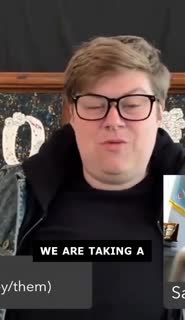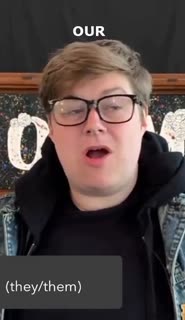Love, Identity, and Liberation: Lessons from Ruth and Naomi
Devotional
Sermon Summary
Bible Study Guide
Sermon Clips
"Good morning, y 'all. My name is Jonah. My pronouns are they, them, theirs. I'm the lead pastor here at Zao MKE Church with Pastor Cameron, who is also my partner and my love. And, we are here at Zao still engaged in the day -to -day work of protest and resistance, deeply involved in the local work of Black Lives Matter. And if you want to get involved, you can sign up for a shift to be present in this space. It's actually quite limited in human contact, and we are masked up and regularly sanitizing." [00:14:57] (37 seconds)
"So, as we are engaged in this day -in, day -out work of protest, we're seeing lots of different things play out on the ground about what it means to do intersectional work, what it means to be truly anti -racist, what it means truly to offer a world to one another where there's a lot of diversity. Black liberation is central and celebrated. And, we're seeing some of the things play out here in Milwaukee that are surely playing out elsewhere in the country." [00:16:19] (32 seconds)
"For Black lives to matter, all Black lives must matter. And for any life to matter, the fullness of life has to matter, including sexuality and romance and intimacy. This is why we are returning today to our relationship series, our love series, called It's Complicated." [00:19:05] (22 seconds)
"We are taking a queer, feminist, anti -racist look at relationships in the Bible and those relationships in the Bible that can teach us something about the beauty of love, the spirituality of love and romance, and what it means to be faithful not only to God but to one another in intimate partnership, in joy, in pleasure." [00:19:27] (21 seconds)
"Queerness in particular is hidden and obscured by the text, but it's also obscured by heteronormative readings. Biblical scholar Jeremy Shipper writes, Heterosexuality is often presumed without explicit justification unless another contemporarily recognized expression of sexual desire is clearly identified in the text, projecting heteronormativity back into ancient Israelite relationships." [00:20:04] (30 seconds)
"So what if we lifted the presumption of heterosexuality? And what if we lifted the presumption of heterosexuality? We opened our reading of the Bible to the presumption that romance was not merely or purely heterosexual." [00:23:51] (14 seconds)
"This is a story about women told by women, and I believe it's a story about queer women, and maybe a queer man, and the ways that queer family and relationships form, despite despite expectations and boundaries of a society not set up for us." [00:25:34] (22 seconds)
"Ruth says, Do not leave me. Where you go, I go. Where you live, I live. Your people will be my people. Your God will be my God. Where you die, I will die. And there I will be buried. May the Lord do thus unto me and more, if even death parts me from you." [00:31:26] (22 seconds)
"Our queer stories Our stories should be stories of beauty. Our Black stories should be stories of beauty. And while we need to bear witness to the pain and suffering of oppression, we also need to bear witness to the beauty and joy of queer identity, of Black identity, of trans identity, of all of the things that we are fighting for to be in our fullness, whoever we are in our intersecting identities of oppression and privilege." [00:36:56] (29 seconds)
"So what follows here is a celebration of subversive strategies to create and sustain families of love across intersecting identities and challenges of oppression." [00:37:23] (15 seconds)
"Ruth, Naomi, and Boaz provide our community with an ancient example of the ways in which we have been creating our families. She praises them for navigating legal systems that were not made for them, finding ways to be family anyway whether or not they are recognized, and having their love and their relationships define who they are more than the lineage and legality of the culture around them." [00:47:55] (30 seconds)
Ask a question about this sermon
"So, as we are engaged in this day -in, day -out work of protest, we're seeing lots of different things play out on the ground about what it means to do intersectional work, what it means to be truly anti -racist, what it means truly to offer a world to one another where there's a lot of diversity. Black liberation is central and celebrated. And, we're seeing some of the things play out here in Milwaukee that are surely playing out elsewhere in the country." [00:16:19] (32 seconds)
"For Black lives to matter, all Black lives must matter. And for any life to matter, the fullness of life has to matter, including sexuality and romance and intimacy. This is why we are returning today to our relationship series, our love series, called It's Complicated." [00:19:05] (22 seconds)
"We are taking a queer, feminist, anti -racist look at relationships in the Bible and those relationships in the Bible that can teach us something about the beauty of love, the spirituality of love and romance, and what it means to be faithful not only to God but to one another in intimate partnership, in joy, in pleasure." [00:19:27] (21 seconds)
"Queerness in particular is hidden and obscured by the text, but it's also obscured by heteronormative readings. Biblical scholar Jeremy Shipper writes, Heterosexuality is often presumed without explicit justification unless another contemporarily recognized expression of sexual desire is clearly identified in the text, projecting heteronormativity back into ancient Israelite relationships." [00:20:04] (30 seconds)
"So what if we lifted the presumption of heterosexuality? And what if we lifted the presumption of heterosexuality? We opened our reading of the Bible to the presumption that romance was not merely or purely heterosexual." [00:23:51] (14 seconds)
"This is a story about women told by women, and I believe it's a story about queer women, and maybe a queer man, and the ways that queer family and relationships form, despite despite expectations and boundaries of a society not set up for us." [00:25:34] (22 seconds)
"Ruth says, Do not leave me. Where you go, I go. Where you live, I live. Your people will be my people. Your God will be my God. Where you die, I will die. And there I will be buried. May the Lord do thus unto me and more, if even death parts me from you." [00:31:26] (22 seconds)
"Our queer stories Our stories should be stories of beauty. Our Black stories should be stories of beauty. And while we need to bear witness to the pain and suffering of oppression, we also need to bear witness to the beauty and joy of queer identity, of Black identity, of trans identity, of all of the things that we are fighting for to be in our fullness, whoever we are in our intersecting identities of oppression and privilege." [00:36:56] (29 seconds)
"So what follows here is a celebration of subversive strategies to create and sustain families of love across intersecting identities and challenges of oppression." [00:37:23] (15 seconds)
"Ruth, Naomi, and Boaz provide our community with an ancient example of the ways in which we have been creating our families. She praises them for navigating legal systems that were not made for them, finding ways to be family anyway whether or not they are recognized, and having their love and their relationships define who they are more than the lineage and legality of the culture around them." [00:47:55] (30 seconds)











